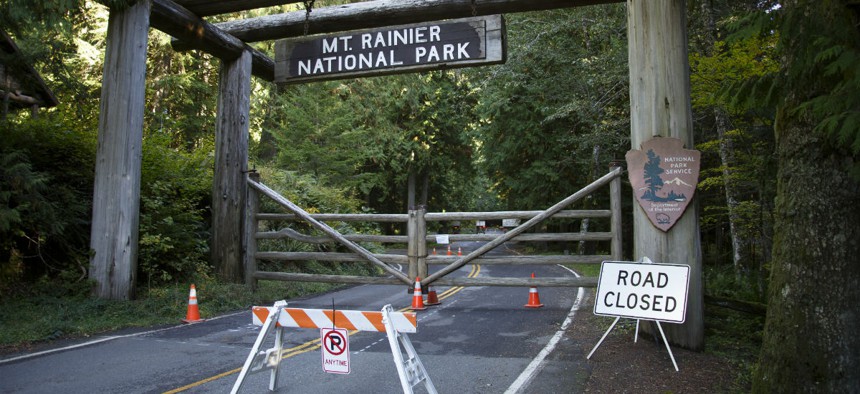
Kevin Bacher/NPS file photo
If the Government Shuts Down, Can National Parks Stay Open?
Senators are pushing to keep America’s parks open in the event of a federal government shutdown.
On its 123rd birthday, Yosemite National Park was closed to visitors.
The iconic American landmark—along with every other U.S. national park and monument, from the Grand Canyon to the World War II Memorial—fell victim to a government shutdown during the fall of 2013 that pit Republicans against the President Obama in a standoff over his signature health care law.
A coalition of senators from Western states want to make sure that never happens again.
Republican Sens. Jeff Flake, John McCain, and Mike Lee have been fighting for nearly two years to pass legislation that they say would help keep parks open during future shutdowns.
Flake and McCain have been joined by Democratic Sens. Michael Bennet and Martin Heinrich in a separate effort to require the administration to repay states, including Arizona, Colorado, Utah, and New York, for the cost of reopening parks to visitors when Washington was closed for business during the last government shutdown.
So far, the bills have met with little success. But supporters of the measures will have the chance to make their case on Wednesday during a Senate Energy and Natural Resources subcommittee hearing. And this time, they hope it works.
"Our national parks are one of the most important parts of America's heritage and Americans should have the ability to enjoy that no matter what machinations are going on here," McCain said in an interview at the Capitol on Tuesday. "We should make sure that they're not closed."
Nobody expects a government shutdown to happen anytime soon. But senators pushing for legislation intended to ensure that states can keep parks open if a shutdown takes place say they are simply thinking ahead.
"Just like a cicada comes back every 17 years, a shutdown may loom again and we want to make sure that states don't take a hit," Flake said in an interview, adding: "We didn't see this last one coming."
The closing of national parks and monuments became a flashpoint in a contentious debate over who should shoulder the blame for the government shutdown that took place in October 2013. Democrats said Republicans were responsible for keeping Americans away from Yosemite as the iconic park celebrated its 123rd birthday, while Republicans blamed Democrats for cordoning off the World War II Memorial from veterans in Washington.
The administration previously voiced opposition to legislation that Flake and McCain say would help keep parks and public lands open in the event of a future shutdown, arguing that it gives an unfair advantage to states that can afford to foot the bill. But the administration has not opposed outright the Capitol Hill push to require the feds to pay states back for the money paid out during the last shutdown.
Western states suffered massive economic loss as a result of the 2013 shutdown. Millions of visitors were turned away from national parks. And local business that prop up the tourism economy were hard hit. The National Park Service estimated that the economic cost of the park closures totaled more than $414 million.
As a result, several states asked the federal government to reopen their parks, pledging to pick up the tab in the process. Six states, including Arizona, Colorado, New York, and South Dakota, paid out roughly $3.6 million to get parks up and running again. When the shutdown ended, states asked for their money back.
"The state of South Dakota incurred a lot of expenses to keep the parks open and it would be nice if the federal government would honor its obligation to repay that," Sen. John Thune said. "We depend heavily on the parks. We're a state where tourism and travel is anywhere from the second or third largest industry in the state."
Parks advocates generally support the idea that the federal government should reimburse the states. But they caution that the money should not come out of the already-depleted parks budget, warning that Congress already has failed to address chronic funding shortfalls that plague the National Park Service.
"What we have now is a slow-motion shutdown as a result of inadequate resources and crumbling infrastructure," said Craig Obey, the senior vice president of government affairs for the National Parks Conservation Association. "Congress should be focused on making sure that parks are open all the time, but neither of these bills deals with any of the fundamental challenges affecting the park system."
National parks suffer from a shortfall of over a half-billion dollars each year, according to the association. That deficit has forced the service to cut back on the number of park rangers, dial back the operating hours for visitor centers and campgrounds, and delay costly maintenance of park roads and bridges.
Congress looks unlikely to fix that problem anytime soon.
The House Appropriations Committee on Tuesday released a draft spending bill that would dole out $2.7 billion for the service. That would represent an increase of $53 million above the 2015 funding level, but parks advocates say that still won't be enough to end the shortfall.
"It's always a challenge to make sure that we have sufficient funding for the parks in a way that attracts tourists to come," Thune said. "But we're looking for ways to be able to do that efficiently and not have to waste resources—help them do more with less."







